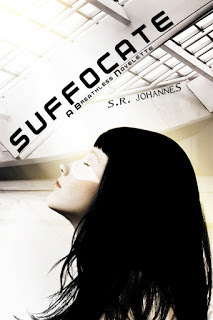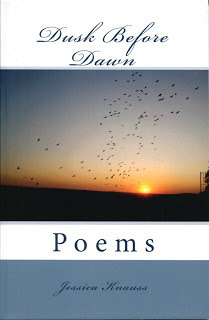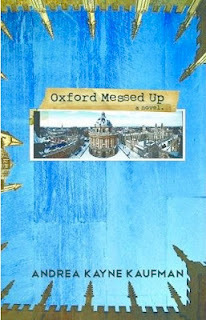Jessica Knauss's Blog, page 49
May 21, 2012
Giveaway: New Release "Suffocate" by S. R. Johannes
 S.R. Johannes’ Suffocate is out today! Help out a soon-to-be-fellow Georgia author by checking it out and entering to win a free ebook.
S.R. Johannes’ Suffocate is out today! Help out a soon-to-be-fellow Georgia author by checking it out and entering to win a free ebook.Suffocate is the first novelette in The BREATHLESS Series. It is a 15,000 word young adult thriller that combines the dystopic and science fiction genres.
Here’s a little about the novelette…
“For centuries, the world outside the Biome has been unlivable. Today, marks the first time anyone will attempt to leave the suffocating ecosphere. Eria is not worried because her scientist father has successfully tested the new Bio-Suit many times. It's a celebratory day until something goes horribly wrong. In the midst of tragedy, Eria uncovers a deep conspiracy that affects the very air she breathes.
If those responsible find out what she knows, they won't stop hunting her until she takes her last breath.”
The second novella in the series, Choke, is scheduled for Fall 2012. The third, Exhale, is scheduled for Winter 2013.
You can purchase Suffocate for only 99 cents atAmazon B&N
And you can add it on Goodreads!
S.R. Johannes is author of the Amazon Bestseller Untraceable and a current nominee of the Georgia Author of the Year in the Young Adult category. After earning an MBA and working in corporate america, S.R. Johannes traded in her expensive suits, high heels, and corporate lingo for a family, flip-flops, and her love of writing. She lives in Atlanta, Georgia with her goldendoodle Charley (notice he is listed first :), her British-accented husband, and the huge imaginations of their little prince and princess, which she hopes - someday - will change the world. You can find her hanging out online and visit her at srjohannes.com
Also check her out on TwitterFacebookPinterestGoodreads
To win the free ebook, please comment on this blog post below before 12:00 am on May 25th and let us know what kinds of YA reads are your favorite. Winner will be determined by a random drawing and will receive one copy of Suffocate in .epub or .mobi via email.
Thanks for entering!
Published on May 21, 2012 00:48
May 18, 2012
New Review of Dusk Before Dawn!
 I am so thrilled Goodreads user "Gorfo"won my poetry volume Dusk Before Dawn in the recent giveaway, because she seems to have been the right audience. I can't tell you how often my heart has sunk when reading a review of my work and finding that I did not find the right reader. The elusive "right reader"is one who is moved by your writing. He or she may have some quibble, but the style and message are right up their alley. Here is what she says:
I am so thrilled Goodreads user "Gorfo"won my poetry volume Dusk Before Dawn in the recent giveaway, because she seems to have been the right audience. I can't tell you how often my heart has sunk when reading a review of my work and finding that I did not find the right reader. The elusive "right reader"is one who is moved by your writing. He or she may have some quibble, but the style and message are right up their alley. Here is what she says:Dusk Before Dawn was a wonderful short collection of poetry. In this collection Jessica Knauss cleverly divides the the poems into sections based on five senses, allowing you to experience each section with a different sense. The Spanish influence in the poems and the almost seamless melding of the Spanish language into many of the works seemed to draw a connection between the reader, the author's thoughts and the struggles and triumphs of Spanish culture. Through these poems I not only felt a connection to the Moors as they were expelled by a new regime, I also felt a connection to everything that makes Spain what it is. I felt a yearning to jump on the first plane and head to Cordoba or Barcelona. However, despite my love for the Spanish language I was shocked that so much of the book was in Spanish, and if I was not a Spanish student I fear much of this delicious poetry would have been lost on me. When I began this book I was not persuaded by the first poem, or the second, but Knauss quickly ensnared me in her trap with the third poem, the fourth poem and many others after. I hope to see more of her work in the future!
Thanks so much! You make me feel like a real poet!
Published on May 18, 2012 00:43
May 16, 2012
Writing with Manolo
As the great singer-songwriter Manolo García recovers at home with all the comfort I can I wish on him, I thought I'd send some good vibes his way by demonstrating a couple of writing tips I've gleaned from one of the songs (poems) on his latest album. I give you the inimitable Spanish with an English translation.
Lo Que Me Diste Cuando Nada Pedí
Sólo he querido de tilo que me diste cuando nada pedí.Perdido en las madrugadasque anticipaban días sin semanas,todo lo quería de ti.Saber que el tiempo que tengosiempre es el mismono quita ni pone años;siempre se tienen los mismos.Sólo he querido de tilo que me diste cuando nada pedí.Te recuerdo con un libro de poemas abiertomientras esperas que cambieel semáforo a verde su luz.Sólo fue un momentoy ese escorado gestoes lo que de ti retengo.Sólo será ese amago lo que me quedede lo que pudo ser.Sólo he querido de tilo que me diste cuando nada pedí.Perdido en las madrugadasque anticipaban días sin semanas,todo lo he querido de ti.Sabes que ante nosostrosse extienden los días intactos.Sólo sabemos eso,que justo el tiempo de desbrozar,tras nuestro errático paso,de nuevo la selva cierra.Y arrastrados por fuerzasno visibles pero ciertas,avanzamos a ritmo fiero de zarabandaque nunca va a parar.Sólo he querido de tilo que me diste cuando nada pedí.Perdido en las madrugadasque anticipaban días sin semanas,todo lo quería de ti.Y todo lo he querido de ti.
My English version:
I only ever wanted from youwhat you gave me when I asked for nothing.Lost in the morningsthat came ahead of days outside of weeks,I wanted everything from you. To know that the time I haveis always the same.It doesn’t take away or add years,you always have the same amount.I only ever wanted from youwhat you gave me when I asked for nothing.I remember you with a book of poems openwhile you wait for the light to turn green.It was only a momentand this leaning gestureis what I retain of you.This feint will be the only thing that remainsof what could have been.I only ever wanted from youwhat you gave me when I asked for nothing.Lost in the morningsthat came ahead of days outside of weeks,I wanted everything from you.You know that the days spread out before us untouched.We only know thatas soon as we make a clearingafter our erratic trail,the jungle closes up again.And dragged along by invisible but true forceswe continue on with the wild rhythm of a sarabandethat’s never going to stop.I only ever wanted from youwhat you gave me when I asked for nothing.Lost in the morningsthat came ahead of days outside of weeks,I wanted everything from youand I wanted everything from you.
This song is packed with beautiful imagery I've taken to heart. Specifically, I've taken the concept of the days spreading out before us untouched to help my writing. Each morning when I can, I approach the computer and think, "This day is untouched, undefined, pure. I will define it with a beautiful session of writing."
Secondly, the song shows that simple images can have the most lasting impact. Just as it impresses the poet, the image of the (presumable) woman sitting in traffic with a book of poems open over the steering wheel or her lap encapsulates everything about that relationship for the listener as well. I hope to find one or two such emblematic images for my novel for the reader to carry away.
Well done and thank you, Manolo. Get well soon.
Published on May 16, 2012 00:31
May 14, 2012
Interview with Andrea Kayne Kaufman
 Andrea Kayne Kaufman is here today as the proud author of Oxford Messed Up, a book so unusual that my review may have seemed more mixed than I intended. I love unusual books, especially ones like this, that have positive messages, and intend to promote them as much as I can whenever I find them!
Andrea Kayne Kaufman is here today as the proud author of Oxford Messed Up, a book so unusual that my review may have seemed more mixed than I intended. I love unusual books, especially ones like this, that have positive messages, and intend to promote them as much as I can whenever I find them! JK: Welcome, Andrea. I understand you're from Chicago, like Gloria, your main character.
AKK: I’m from Beverly Hills but have made Chicago my home, through and through.
JK: Among other things, Oxford Messed Up is academic in atmosphere. Does that have anything to do with your non-fiction career?
 AKK: I have a Masters in Education and a law degree and currently serve as Chair of the Department of Leadership, Language and Curriculum at DePaul University. I try to create a balance between my life as a professor, my life as an author, and being a mom and wife. It’s a full, wonderful, and busy life.
AKK: I have a Masters in Education and a law degree and currently serve as Chair of the Department of Leadership, Language and Curriculum at DePaul University. I try to create a balance between my life as a professor, my life as an author, and being a mom and wife. It’s a full, wonderful, and busy life.JK: Tell us a little more about the book and who you envision reading it.
AKK: Oxford Messed Up is a unique literary love story that transports readers on a meaningful and emotional journey where the academic world of Oxford, the music of Van Morrison, and an old claw-foot bathtub serve as a backdrop for learning, self-discovery, and transcendent love. Rhodes Scholar Gloria Zimmerman is an academic superstar who has come to Oxford University to study feminist poetry. Yet the rigors of the academy pale in comparison to her untreated Obsessive-Compulsive Disorder. Her next-door neighbor (who is also, to her mortification, her loomate) is Henry Young, the appealing but underachieving musician son of an overbearing and disapproving Oxford don. Gloria and Henry's relationship evolves from a shared obsession with Van Morrison's music into a desire on the part of each to fill in the gaps in the life of the other. Yet the constraints of a debilitating illness and the looming revelation of a catastrophic secret conspire to throw their worlds into upheaval and threaten the possibilities of their unlikely yet redemptive love.
The intended audience is anyone who’s ever thought about whether they deserve happiness and love, anyone who’s struggled with a self-saboteur, anyone who loves poetry or music. Come to think of it, I think, anyone who’s ever breathed!
JK: How does real life affect your fiction?
AKK: My love of Van Morrison and poetry are infused throughout this book, which starts out in my hometown of Chicago. My experience watching and helping a family member cope with OCD fueled this novel. The notion of a love triangle between two loved ones and their internal self saboteurs are all too real. My main characters, Henry and Gloria, each have pieces of me in them.
I value language tremendously and thought through every word choice in this book to an exhausting degree, particularly the language surrounding Gloria’s OCD. I wanted and needed that to be authentic and accurate.
JK: What is your favorite book?
AKK: My favorite book is Jane Austen’s Pride and Prejudice. It’s also my favorite feminist treatise of all time. I think Elizabeth Bennet’s rejection of Darcy’s first proposal is one of the most important scenes in all of literature. With no dowry and no prospects, Elizabeth is self-actualized and has the courage to say “no” to one of the most eligible bachelors in England. For years, I have strived for her internal locus of control, rereading Pride and Prejudice every year on my birthday.
JK: What else influences your work?
AKK: What doesn’t influence my work might be a better question! My teaching and research do, as does my personal life. Clearly music and poetry inspire me. My family, my city, my love of travel, and my desire for personal growth. Everything is a potential muse.
JK: Do you have a favorite word?
AKK: For this novel, redemption was my touchstone word. It’s what both characters want and need and something I’ve spent a lifetime working to allow myself.
JK: How much time a day do you devote to fiction writing? What is your work area like?
AKK: I have writing days. I also have teaching days. So on a writing day, I try to devote the day’s work to writing. My day starts with a long walk along Lake Michigan to clear (or fill?) my head. The familiarity lets me enjoy my surroundings while also letting my mind off its leash. Some days I even have to sit down to capture a character’s voice or epiphany on my iPhone recorder.
Then I head home and write in my office. I’m not going to lie; I’m not as organized as I’d like to be or as neat as I’d like to be. I’m no Gloria! But, because I have classes and students and my own children and my fiction writing, I can’t be Henry either.
JK: Do you have any methods that might seem unusual or inspiring to other writers?
AKK: My methods involve a lot of music. Each character gets a soundtrack or song that I’ll often listen to while thinking or writing about them. I was also known to read scenes aloud from the bathtub, much to the amusement of my husband. Many of the critical scenes in this book take place in or near an old clawfoot tub. I considered those long baths I took research!
JK: They certainly were! When and why did you get started writing? What characteristics from your first efforts survive today?
AKK: I’ve always written. It’s just been a matter of what. Poetry has been a part of my personal canon for as long as I can remember. As I moved into the world of academia, research-based writing was my primary medium. And, as I said, this novel emerged from a particularly challenging time in my family’s life. I got started writing so I wouldn’t lose my mind. My family is in a much, much better place now but I’ve found that fiction writing is an incredible balance to my world as a professor. Deep in the recesses of my basement, I have journals filled with poems and people and other fragments which I am now bringing into the world.
JK: I personally couldn't find a balance between fiction and academia, so I stand in awe. Are your family and friends supportive? What other kinds of feedback have you gotten?
AKK: Many people tell me Oxford Messed Up made them cry, in a good way. I have heard it described as a page turner. People tell me they miss Gloria and Henry when the book is over. One reader recently told me she made excuses to go to the washroom during work because she had to know what happened. The feedback I get tends to be a sense of gratitude for writing a smart book about smart people trying to figure stuff out. Gloria and Henry resonate with people because they feel real, human, flawed, and well, just like us.
I took presenting OCD accurately and with sensitivity so seriously that I think the community of people impacted by this disease have rallied behind the book. It’s thrilled me. But this book is not meant for just the people who have experienced OCD. It’s about the fight we all must undertake to embrace and choose happiness. As I was writing, I was thinking about what I needed to do to embrace and choose happiness and it’s something I try to keep in mind daily since finishing the book.
I hope that anyone that likes a good love story, smart, believable characters, and of course Van Morrison, find something to love about Oxford Messed Up.
JK: Do you have any advice for writers based on your successful experience as a novelist?
AKK: My advice to new writers: Start. Speak into a voice recorder. Pick up a pen. Put some paper in the typewriter. Open a new document in Word. Whatever your medium the characters cannot tell you their stories unless you are willing to take steps to record them. They’ll tell you where to go.
JK: Thank you so much for being here today, Andrea.
See more about Oxford Messed Up, with availability and links, here. See more about Andrea and her writing here.
Published on May 14, 2012 00:31
May 10, 2012
Get well soon, Manolo!
I mentioned Manolo Garcia yesterday in my review. On Monday he had an emergency operation for apendicitis! The news outlets only talk about concerts being postponed, but I'd love to know how he's doing and where it happened.
But even without all that, I and all your fans on this side of the pond wish you a swift and pain-free recovery, Manolo!
But even without all that, I and all your fans on this side of the pond wish you a swift and pain-free recovery, Manolo!
Published on May 10, 2012 00:11
May 9, 2012
Review: Oxford Messed Up
 Oxford Messed Up is the story of a couple of confused kids in a crazy, mixed-up world. Gloria suffers from severe germophobic OCD, and Henry is a recovering drug addict with some serious attendant complications. The two couldn't be more different, and and yet when they meet in the loo they share on the Oxford campus, the sparks are palpable. Perhaps their similarly stifling family environments bring them together. Luckily, Henry honestly cares for Gloria and is patient with her problem, and it happens to be therapeutically good for her to fall in love with someone with such terrible hygiene. The book recently won the Best Adult Fiction E-Book Gold Medal in the Independent Publisher Book Awards. It treats subjects not often seen in love stories and the innovation is to be applauded. It's a book about intelligent people making the tough choices that will ultimately improve their lives, written by a clearly sensitive writer.
Oxford Messed Up is the story of a couple of confused kids in a crazy, mixed-up world. Gloria suffers from severe germophobic OCD, and Henry is a recovering drug addict with some serious attendant complications. The two couldn't be more different, and and yet when they meet in the loo they share on the Oxford campus, the sparks are palpable. Perhaps their similarly stifling family environments bring them together. Luckily, Henry honestly cares for Gloria and is patient with her problem, and it happens to be therapeutically good for her to fall in love with someone with such terrible hygiene. The book recently won the Best Adult Fiction E-Book Gold Medal in the Independent Publisher Book Awards. It treats subjects not often seen in love stories and the innovation is to be applauded. It's a book about intelligent people making the tough choices that will ultimately improve their lives, written by a clearly sensitive writer.Make no mistake, this book is a commentary on the Scriptures, the holy texts being the lyrics of Van Morrison. Because I am not familiar with Van Morrison's oeuvre, it was hard for me to sympathize with characters who are so obsessed with him. Only after I finished did I think to replace "Van Morrison" in the text (it shows up on almost every page) with my own favorite singer-songwriter, Manolo Garcia. What a thrilling book that would have been!
Overall, this book will strongly appeal to people who are recovering from a disease or addiction. Gloria's progress through cognitive behavior therapy is spectacular, nearly unbelievable, but inspiring. I wanted a bit more about what it felt like to be OCD. We could hear the thoughts, but I wondered about the physical sensations Gloria felt. When someone spills a Coke on her, she goes nuts, but what does the sticky sweet substance really feel like to her sensibilities? When the dog licks her, does she feel dirty for hours afterward? Would she rather run off to take a shower in chemical sanitizer than calmly keep walking with her new boyfriend?
I didn't think the epilogue was necessary, but, again, some readers will love it. The academic atmosphere seemed just as idealized as everything else in this wonderfully optimistic world. I love optimism, but in my experience, academia is not a place where it can flourish.
Tune in to this blog next week for an interview with the author of this intriguing book!
Published on May 09, 2012 00:37
May 7, 2012
It's a Go! Part Two!

I wouldn't have dared to write it, for fear it would seem too hackneyed and unlikely. We were driving through the wilds of New Mexico, almost back to our Tucson home with all our worldly possessions in a 14-foot U-Haul truck, when my husband's boss called. Yes, my husband answered the phone while he was driving, tsk tsk. I took out my left earbud and heard the most outlandish things:
"How many seats will it be?"
"How many people would report directly to me?"
These are the kinds of things I overhear when my husband has a phone interview. So after a good ten or twenty minutes of suspense, he said the most telltale thing of all, "Let me talk it over with my wife," and hung up.
I said, "What? What?"
He said, "Todd started out by saying, 'This may be an inopportune moment, since you must be almost back to Tucson with all your earthly possessions, but we've just won the contract for Atlanta. If you want the job, you can have it.'"
My husband hates Arizona with a passion, so it was pretty much foregone that we would take it. We've been trying to get out of here ever since we set foot here against our will. It was another full week of back and forth negotiation and confirmation, and now we're supposed to be moved in by the first week of June. We'll miss "monsoon" and the worst of the desert summer heat, only to dive into the dripping wet heat I understand occurs in Atlanta. But oh, Atlanta has seasons. It's everything we've been looking for! I've lived in all the other US regions except the Southeast, so it's overdue.
But more on that some other day. Now is the time to say, "Isn't it NUTS that we're leaving only now that we went to get our stuff in storage?" I admit I had an inkling that it would happen in a way similar to this, but I would not have predicted that we would still be in the U-Haul when we got the call! Astounding.
Published on May 07, 2012 00:30
May 4, 2012
How Else Do You Read?
Dictionary.com distracted me again.
This article explains two different modes of reading: lexical and phonological. The lexical way picks out only the meaningful words as opposed to grammatical function words, and can thus be done speedily. The phonological mode would seem to be the result of having been told to "sound it out" during the learning process and can take almost as long as actually reading the text out loud. The article proposes that though this is a better way to go about copyediting, few people do it.
I employ the phonological mode of reading automatically. It sometimes frustrated me that I was a slower reader than some, but then again, I knew I was getting more enjoyment and comprehension out of it. Now it turns out that this is what makes me a good copyeditor. Ah, validation!
I still take the article's point about technology making us sloppier. I know I rely more heavily on the red underlining of misspelled words more than any human being should. The key is what you do when you see the red underlining. Do you take the computer's suggestion, or consider it critically based on years of training and experience?
As I've been telling a few of my authors lately, there will always be a stray gremlin or two in published material. Now I know that it's because these two modes of reading dominate, and neither one can catch every error, every time. Is there another way to read that would be superior for copyeditors? Sign me up for that seminar!
This article explains two different modes of reading: lexical and phonological. The lexical way picks out only the meaningful words as opposed to grammatical function words, and can thus be done speedily. The phonological mode would seem to be the result of having been told to "sound it out" during the learning process and can take almost as long as actually reading the text out loud. The article proposes that though this is a better way to go about copyediting, few people do it.
I employ the phonological mode of reading automatically. It sometimes frustrated me that I was a slower reader than some, but then again, I knew I was getting more enjoyment and comprehension out of it. Now it turns out that this is what makes me a good copyeditor. Ah, validation!
I still take the article's point about technology making us sloppier. I know I rely more heavily on the red underlining of misspelled words more than any human being should. The key is what you do when you see the red underlining. Do you take the computer's suggestion, or consider it critically based on years of training and experience?
As I've been telling a few of my authors lately, there will always be a stray gremlin or two in published material. Now I know that it's because these two modes of reading dominate, and neither one can catch every error, every time. Is there another way to read that would be superior for copyeditors? Sign me up for that seminar!
Published on May 04, 2012 00:18
May 2, 2012
Readers Have The Power of the Force
Readers, do you realize how much power you have? Please take a look at this all-too-true presentation explaining the publishing industry with Star Wars Figures.
I hope this has inspired you to go out and use your amazing powers!
I hope this has inspired you to go out and use your amazing powers!
Published on May 02, 2012 00:46
April 30, 2012
Storage Stories
 Hey, it smells like books in here!The picture shows the back of our UHaul as it appeared before we drove it away from Pennsylvania. Chock full of good stuff. We had left it at the self-storage facility for about a year and a half, which was a lot longer than we'd hoped for and certainly longer than I've been separated from my personal library and ancient furniture, ever. How strange do I feel now that it's all in the same place as me? Did the past 18 months really happen? All that psychological strain, did it amount to anything?
Hey, it smells like books in here!The picture shows the back of our UHaul as it appeared before we drove it away from Pennsylvania. Chock full of good stuff. We had left it at the self-storage facility for about a year and a half, which was a lot longer than we'd hoped for and certainly longer than I've been separated from my personal library and ancient furniture, ever. How strange do I feel now that it's all in the same place as me? Did the past 18 months really happen? All that psychological strain, did it amount to anything?Before we left, my husband had time to mention the TV show Storage Wars to the manager as an element in his unique sense of humor. It wasn't so funny when it got real and the manager replied that they'd been lucky and hadn't had an auction there in three years. There but for the grace of God...
A year and half isn't so terribly long, I suppose. A coworker of mine says she once had stuff in storage for three years! I have to doubt that she cared for the items left behind as much as I have cared for mine. To anyone else, it might look like junk, but as I've said before, my stuff is imbued with the story of my life. It hasn't been a bad life by any stretch, but it is a life meant to go on short trips while maintaining a completely furnished home base. My husband and I now hope that we can stay put. The great wandering needs to come to an end.
While we were on the road, I was reminded that wandering is an important part of my family history. When we visited for the day, my grandmother talked about how she took her husband, kids, and just the clothes on their backs and headed from Oklahoma to California in the 1950's, selling off or abandoning what few other possessions they had. California was a truly fresh start.
Now that I have all this stuff, of course it occurs to me that if/when we move again, it could be time to make a radical fresh start like that. But then I remember how Grandma ended her tale. "That was really dumb," she said. They should have at least brought a chair to sit on at their destination. Thanks, Grandma!
Published on April 30, 2012 00:19



